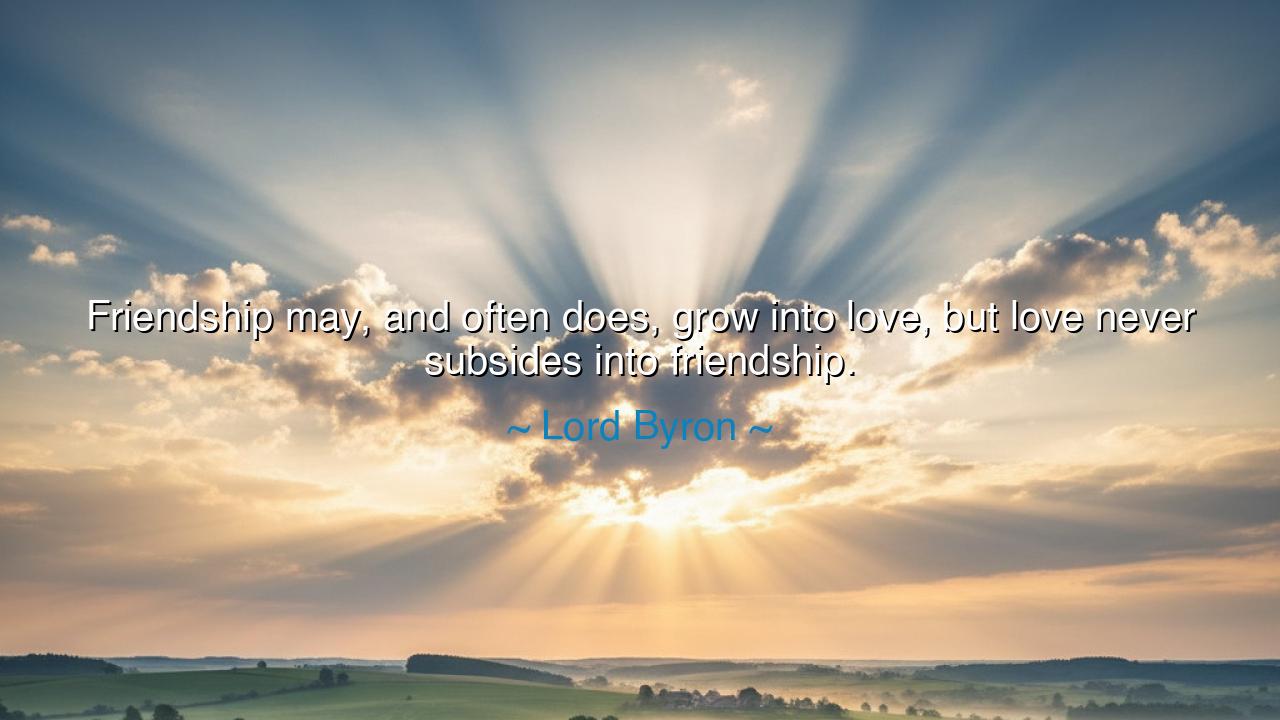
Friendship may, and often does, grow into love, but love never
Friendship may, and often does, grow into love, but love never subsides into friendship.






"Friendship may, and often does, grow into love, but love never subsides into friendship." Thus spoke Lord Byron, poet of passion and wanderer of the soul, whose words burn with both tenderness and melancholy. In this single line, he captures the eternal tension between two of humanity’s deepest bonds — friendship and love. Friendship is the gentle dawn of connection; love, the blazing noonday sun. One may grow into the other as warmth deepens into flame, but once the heart has known the fire of love, it cannot return to the cool calm of friendship. For love, once awakened, transforms the soul utterly — and no heart can forget its own burning.
In the days of old, the philosophers of Greece spoke often of friendship and love. Plato, in his Symposium, described love as the soul’s longing for beauty and truth — a friendship elevated to the divine. Aristotle called friendship “one soul dwelling in two bodies,” yet even he knew that passion could both strengthen and endanger it. Byron, who lived centuries later, saw these truths not as abstractions but as experiences carved into his own heart. He had loved fiercely, often recklessly, and through those loves learned what the ancients hinted at: that when friendship blossoms into love, it is nature’s highest harmony — but when love fades, it leaves behind ashes too sacred to touch. Friendship cannot rise from those ashes, for the heart remembers what once was flame.
To understand Byron’s wisdom, consider the story of Abelard and Héloïse, the scholar and his brilliant pupil of medieval France. Their bond began as mentorship — a friendship of minds joined in learning. But affection, once kindled, grew into a passion that defied the world’s conventions. Their love consumed them both, bringing tragedy and separation, yet even in letters written from cloistered solitude, Héloïse confessed that she could not turn her love into friendship. “You may call it friendship,” she wrote to Abelard, “but I feel only the remains of love.” Their bond had risen beyond the realm of friendship — and could never return.
This is the truth Byron reveals: friendship may become love, for love is but friendship given wings, charged with desire and devotion. Yet once it soars into love’s domain, it cannot descend again without breaking. The heart cannot pretend ignorance once it has known intimacy; the eyes cannot forget the light they once beheld. Love alters the very essence of affection, deepening it beyond the boundaries that friendship can sustain. To ask love to return to friendship is to ask the ocean to shrink again into a stream.
And yet, there is beauty even in this sorrow. For Byron’s quote is not a lament, but a recognition of love’s sacred finality. Friendship is mortal; love, once true, is eternal — even if it must live thereafter as memory. The lover may part from the beloved, the passion may cool, but the bond, once created, cannot be reshaped into something simpler. Its ghost will walk forever in the corridors of the heart. And perhaps that is as it should be, for not all things meant to end should be forced to endure in lesser forms.
Byron’s own life was a testament to this philosophy. His friendships often bloomed into love, for his heart, as he once wrote, was “too warm to last.” He loved with all the intensity of a soul that could neither rest nor forget. And when those loves ended — as many did — he did not seek to disguise them as friendships. He understood that to pretend such a transformation was to deny the truth of the passion that once lived there. Thus, his words are not cynical, but reverent: he honors love as something too mighty, too transformative, to be reduced into calm companionship.
Lesson: The bond between friendship and love is a sacred progression — one may rise to the other, but never fall back unchanged. When love ends, let it rest with dignity, rather than forcing it into a false shape.
Practical action: Cherish your friendships as the fertile ground from which love may grow. When love comes, honor its fire, knowing it is both gift and trial. And when it departs, do not try to make it small again — instead, keep its memory as a lesson in the soul’s capacity to feel deeply. For as Lord Byron teaches, friendship is the root and love the blossom; one can grow into the other, but never wholly return. To love, then, is to risk loss — but it is also to live in the fullest light that the human heart can bear.






AAdministratorAdministrator
Welcome, honored guests. Please leave a comment, we will respond soon